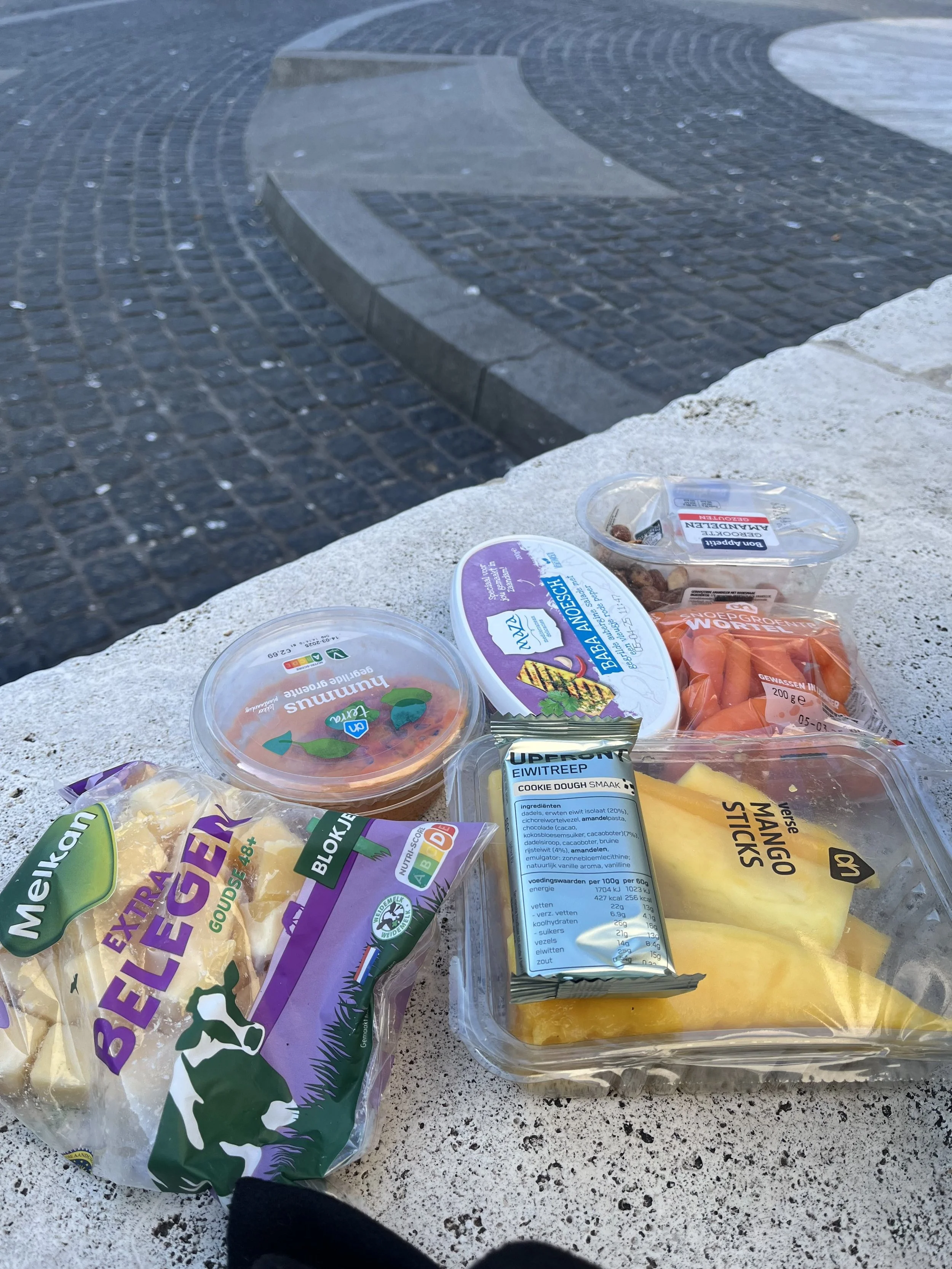No Routine, No Problem: How to stay healthy while travelling
Atalaya de Femes, Lanzarote
I’m about to turn 25 this year, and if I’m honest, I’ve always been someone who finds comfort in control, especially around routine, food, and structure. But over the past year, I’ve been travelling constantly, and it forced me to rethink how I approach wellness when nothing feels predictable.
In this post, I’m sharing how I didn’t throw everything out the window, the small mindset shifts, daily habits, and surprisingly simple things that made the biggest difference, especially if you’re navigating travel, summer, or just life feeling a bit chaotic.
The year everything got messy (and better)
Every year I said I’d travel more. Explore. Loosen my grip on routine. Be more spontaneous.
And I did go on a few trips here and there- visited my parents, took time off when I could-
but I hated how out of routine I felt every time. The discomfort of having to readapt, catch up, feel like I was falling behind… it always made me want to rush back to structure as quickly as possible.
Maybe because deep down, I liked comfort, familiarity, (control?). The gym 5 times a week, meal prep, structure… it gave me comfort. Predictability. A sense that I was ‘on track’.
And look, I’m a nutritionist. This is what I do, and what I’m supposed to do. Stay consistent and disciplined, show up. But this year has felt different.
It’s felt like an experiment, in letting go a little, in living more, in figuring out what balance actually means outside of structure. Not abandoning the habits I’ve built, just testing what happens when I stop gripping them so tightly.
The quarter-life-crisis?
I was turning 25 in July, and something shifted. There were things I hadn’t done. Places I hadn’t seen. A version of myself I hadn’t really let out yet. Call it a quarter-life crisis or just the quiet panic of time passing.
And suddenly, I just wanted to do all of it.
Not someday. Not when it’s “less busy.” Now.
So I booked Barcelona, my first ever solo trip in November 2024. And that opened the door to everything. Amsterdam. Nice. Paris. Santorini. Madeira. Lanzarote. Rome. Florence. Venice. Paris again. I’m spending August in New York, then heading to Valencia.
It’s been constant movement, and for once, I haven’t felt guilty for stepping out of my routine.
Train to Venice, Italy
I’m writing this on the train to Venice, in one of those rare in-between moments where you can actually take a breath and reflect.
I’d just booked New York for August, a trip I’ve wanted to take for years, and it hit me how different things feel now.
I’m not stressed about being out of routine, I’m not panicking about how I’ll ‘stay on track’… I’m actually excited. Because somewhere along the way, I stopped obsessing and started trusting that I can adapt. And that’s changed everything.
It’s something I’ve had to learn through experience, and it’s why I felt like now was the right time to write this.
What’s made this even more relevant for me lately is the amount of messages I’ve been getting from people I coach, asking about travel, saying they’re worried about being out of routine, summer throwing them off.
Summer arrives and suddenly everyone’s either anxious and terrified of going off track… or planning to ‘let go’ completely and make up for it later.
And I get it. I used to think like that too. Travel, anything out of routine used to feel like a threat, like it would undo everything.
So how do you keep showing up for yourself when you’re out of routine, travelling, saying yes to life, and nothing looks like your usual structure?
I definitely don’t have all the answers, but after months of being in and out of structure, I’ve picked up a few things that genuinely helped.
Some mindset shifts, some practical tips: all small, realistic things that made it easier to look after myself without going to extremes.
These aren’t rules or a perfect formula, just what’s actually worked for me, more than once, in different places and seasons.
Maybe they’ll be helpful for you too.
Here are 11 of them.
1) If your usual habits aren’t doable right now, focus on what is
When you’re out of routine, your usual habits might not fit. And that doesn’t mean you’ve failed or that you have to give up completely.
If you normally go to the gym but can’t while you’re away, try putting that energy into something else that still supports your health. You could focus on getting 8 hours of sleep, getting your steps in, improving digestion, drinking more water, or just taking 10 minutes to stretch, meditate or do some deep breathing.
The point is: you’re still looking after yourself, just in a different way. It’s not ‘all or nothing’. You can shift the focus, set new goals, and still feel like you’re making progress in other areas.
For me, that focus was meditation. While I wasn’t in my usual routine, I saw it as a chance to really lean into something I’d always wanted to be more consistent with. It gave me clarity, calm, and a sense of control in a different way. And when I went back to London, I came back with so much more progress in that area. It’s something I probably wouldn’t have built properly if I’d stayed locked into my usual schedule, and it’s added so much value to how I move through the rest of my routine now.
2) Find the nearest grocery store
This is one of the easiest ways to stay on top of how you feel without overthinking food. I’ll always pick up a few staples like bottled water, mini Babybels, nuts, fruit, kefir, or Greek yoghurt. You can keep most of it in the hotel fridge, and some in your bag if you’re out all day.
Snack break, Amsterdam
Even if you’re having fun with meals out (which you should), this gives you easy options when something’s missing. Like if lunch was great but didn’t have much protein, you can just have a bottle of kefir or a Babybel later. Just smart little add-ons that help you stay balanced.
3) Pack a set of travel cutlery. It’s a small thing, but easy to forget.
No need to overexplain why, if you’ve ever had a yoghurt in your bag and no spoon, you get it. It’s such a simple thing to forget, but having a basic fork or spoon with you means you can actually eat the food you’ve picked up. Especially useful for quick supermarket snacks.
4) Front-load nutrition when you can
Radisson Blu, Lanzarote. Breakfast buffet.
If I have a busy evening coming up (social plans, travel, unknown meals), I make sure my breakfast and lunch are nutrient-dense. Lots of:
✅ protein ✅ fibre ✅ colour
I try to tick the important boxes early. It’s about giving my body what it needs before things get unpredictable. That way, even if dinner has to be pizza and cake, my body’s already had what it needed earlier in the day.
And sometimes, that actually means leaning into the all-you-can-eat hotel breakfast.
It might seem counterintuitive, but when I’m travelling, it’s been one of the easiest ways to get a solid, nutrient-dense meal in early. I’ll go for eggs, fruit, wholegrain toast, oats, Greek yoghurt, cheese, coffee, basically a mix of protein, fibre, colour, and familiar foods.
It feels satisfying, energising, and honestly gives me that “home food” balance even while away.
Of course, it depends on your preferences, some people prefer lighter starts. But for me, it’s made the rest of the day feel easier and more flexible, without overthinking it.
5) If you’re away for more than a few days, get ClassPass if you can
When I’m just away for a weekend or a short trip, I usually don’t train, I’ll walk loads, dance, hike, explore, and let that be enough. But on longer trips, I start to miss the gym. I just genuinely enjoy it and like how it makes me feel.
That’s where ClassPass comes in. You don’t need a full membership, and you can try out studios in different cities, strength training, yoga, Pilates, whatever suits your mood. It helps bring some structure back in, but in a way that feels flexible and fun, not rigid. It's honestly been such a good way to stay active and feel like myself again when I’m away for longer.
In Amsterdam, I ended up working out at some really cool gyms, and even booked a cold plunge and sauna session at a wellness space I never would’ve found otherwise. It didn’t just help me stay active, it actually enriched the whole experience.
6) Stick (roughly) to your body clock
When I travel, one of the first things I notice is how off my digestion feels. Tired but wired, bloated for no reason, random dips in energy, usually it’s because my eating and sleeping are all over the place.
Your body runs on a rhythm; it likes doing certain things (like digesting food or producing sleep hormones) at specific times of day. When that circadian rhythm gets thrown off, everything else does too.
So even if your routine’s a bit messy, a few small things can help keep things more balanced:
Try to eat with the local time as soon as you arrive, even if you’re not super hungry. It helps your body adjust faster.
Avoid big, heavy meals late at night if you can. Your digestion naturally slows down in the evening, so late-night meals tend to sit heavier.
Get outside in the morning, even for 10 minutes, natural light first thing helps reset your body clock and improves energy and mood.
Try to keep your mealtimes somewhat regular, even if you’re eating different foods every day.
You don’t need to be perfect about it, but the more you can support your body’s natural rhythm, the better you’ll feel. Especially if you’re prone to feeling sluggish, bloated, or ‘off’ when you travel.
7) Build in movement wherever you can
Look for little chances to move. Take the stairs instead of the lift. Walk instead of relying on public transport when you can. Pack comfortable shoes so you’re not held back by sore feet (it makes a huge difference). I once did 30,000 steps in Italy in the wrong pair and learned the hard way that cute doesn’t always mean practical. Even short walks after meals can help with digestion, energy, and clearing your head. It all adds up.
8) Pick local dishes that are naturally balanced, or tweak them slightly
You don’t need to overhaul the menu, just make small swaps that help you feel better after eating. If you’re having pizza, add a side salad. Ordering pasta? Go for one with chicken, prawns or tofu instead of just plain. In a tapas spot? Include something with protein like tuna, grilled veg alongside the bread and cheese.
It’s not about restricting, it’s just about building meals that fill you and fuel you. You’ll feel more satisfied and probably more energised for the rest of the day too.
9) Choose the experiences you actually want
In Italy, there was no way I was skipping gelato, it was 35°C, I was melting, and it’s part of the experience.
That said, I didn’t feel the need to have every dessert everywhere. I just picked the ones that felt worth it to me, the ones I actually wanted to try and fully enjoy. Not just any gelatos either, 3 scoops, full-sugar, full-fat, waffle cone and all. Some of the best gelatos of my life, and honestly, some of the best memories too. Sometimes I found great sugar-free options too (like in Rome, or some spots in Florence and Venice), and I went for those as well.
It’s about being intentional.
The key? I didn’t say yes to every dessert just because it was there. I chose the ones I genuinely wanted, enjoyed them properly, and moved on. That mindset made the whole trip feel joyful and balanced.
10) Eat in a calm-ish state (when you can)
It’s not always possible, especially when you’re on the move or grabbing food between activities, but digestion works best when your nervous system is in ‘rest and digest’ mode, not ‘go go go’ mode.
When you’re rushing, stressed, distracted, or eating on the run, your body doesn’t prioritise digestion. Blood flow is pulled away from your gut, and things like stomach acid and enzyme production slow down. That can lead to bloating, indigestion, or feeling overly full even after a normal-sized meal.
If you can, pause before you eat. Sit down. Take a few breaths. Put your phone away. Even slowing down for the first few bites helps signal to your body that it’s safe to digest. The goal is to activate the parasympathetic nervous system, your ‘rest and digest’ mode. This improves vagus nerve activity, increases salivary enzymes, and promotes better peristalsis (the movement of food through the digestive tract).
11) Last but not least: Understand that life moves in seasons
The truth is, some seasons in life are about discipline and structure. You’re in the gym five times a week, your meals are prepped, everything’s predictable, and it feels good. You feel strong, proud, consistent, and grounded. That season is powerful, and I love it when I’m in it.
But then there are other seasons : of travel, of change, of joy, of chaos, of grief, of growth. The kind that force you to let go of the perfect routine and lean into something messier. And those seasons matter too. Life will pull you into new chapters, and the routine might shift.
Travelling has introduced me to a version of myself I hadn’t met before.
More open. More present. More alive, honestly.
I can genuinely say I’ve never felt more fulfilled. And yet... it meant giving up the routine I’d clung to for years. Letting go of that wasn’t easy, but I’ve realised it’s not about giving it up forever. It’s just seasons.
Some seasons are about structure and strength. Some are about softness, expansion, trying new things. And both are valid. One doesn’t cancel the other out.
The gym will always be there. And if that’s your priority right now, honour that fully. Go all in. But if it’s something else that needs your energy right now, whether that’s rest, travel, work, relationships, that’s valid too.
It’s just about understanding what season you’re in, and letting yourself live it.
Here’s What I’ll Leave You With
The truth is, adaptability is a skill, and it’s one of the most underrated tools for reaching your goals. Honestly, it’s the thing that will carry you every single time.
Because no matter how perfectly you plan, life will shift. Routines will break. Holidays will come up. You’ll get busy. You’ll get tired. You’ll get thrown off.
That’s not failure, that’s being human.
And when we talk about things like sustainable eating, movement, and self-care, we can’t just ignore the fact that change will happen. You won’t always be able to control your environment or your schedule. And that’s okay. In fact, it’s better than okay, it’s an invitation to grow.
The goal isn’t to avoid discomfort. It’s to build a life where you can honour your needs even when things feel messy. Where you trust yourself enough to adapt.






